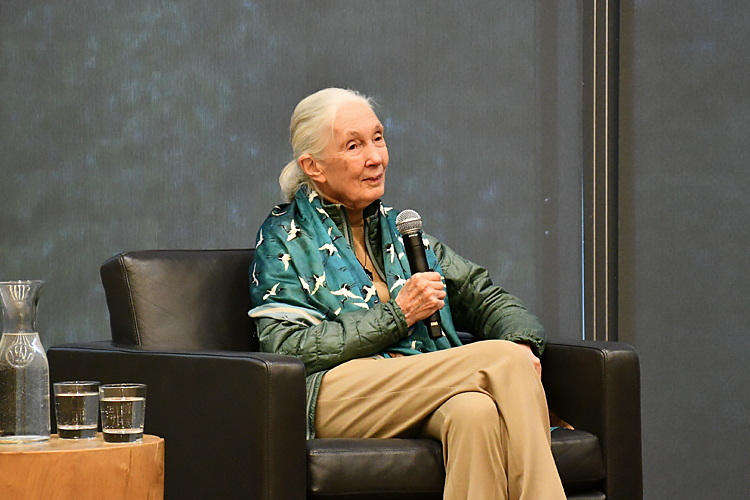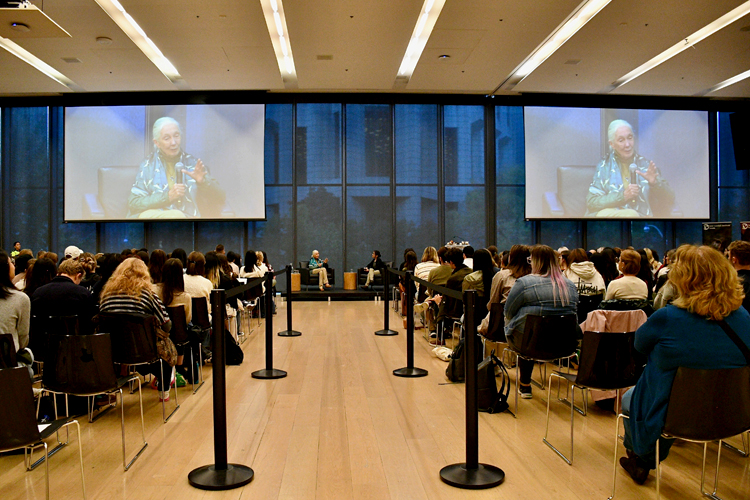On Friday, October 13, legendary environmentalist and conservationist, Dr. Jane Goodall, thrilled students when she appeared in person for a highly anticipated talk at Desautels Hall. The event was hosted by the School of the Environment, the Faculty of Arts & Science, and the Jane Goodall Institute of Canada (JGI), which has a longstanding relationship with U of T through the school.
Dr. Goodall entered the hall to enthusiastic applause, and then took the podium to greet everyone with a wild animal call, a series of hoots and cries that she said meant “Me, Jane” in chimpanzee.
She then began to recount the story of her extraordinary life. She started at the beginning, musing on her early years growing up in London with a fascination for animals, a dream of one day going to Africa, and a mother who always encouraged and supported her ambition.

A trailblazer in so many respects, Dr. Goodall recalled being a young woman in the 1950s. With only a modest education, she saved all her money for months to visit Africa, where she fatefully met renowned anthropologist Louis Leakey. He offered her a job at the Natural History Museum in Kenya (where he was curator) after seeing her unbridled love of animals, and soon offered her the life-changing opportunity to study chimps in the wild.
She spoke fondly of her time living in Tanzania’s Gombe National Park with the chimps, how they came to accept her, and how she developed a bond with many of them, even giving them names, like Mr. McGregor, David Greybeard, and Flo. She explained that Leakey chose her because she wasn't a scientist, and her mind, she said, was “unaffected by the reductionist attitude to animals of science at the time.” But eventually, to be taken seriously in the field, she needed a degree. She enrolled at Cambridge University to earn her PhD, where faculty criticized her empathetic approach to animal research.
I could spend hours alone in the rain forest. I feel this strong spiritual connection with the natural world.
“I was told by so many erudite professors that I’d done everything wrong,” she said. “That a scientist must be absolutely objective, and if you have empathy, you can't be objective, which is rubbish.”
A firm supporter of animal rights, she went on to discuss that many animals are quite intelligent, have personalities, and experience feelings and emotions — especially strong ones like pain and fear — so it’s important for people to treat animals ethically and with respect.
After earning her doctorate, she returned to Gombe, and in 1977 she founded the JGI. Nearly a decade later, her focus shifted from research to conservation after attending a conference and learning about the decreasing chimpanzee population due to loss of habitat.

“It was shocking. Everywhere the chimps were being studied, forests were being cut down, and chimpanzee numbers were decreasing,” she said. “I went to that conference as a scientist, but I emerged as an activist. I didn't have to make a choice, it just happened.”
Dr. Goodall soon learned that poaching and trafficking weren’t the only threat to chimp populations. Many impoverished African communities were cutting down and farming traditional chimp habitats, inspiring the JGI to develop its first community-led conservation program. The JGI enlisted the help of local Tanzanians to raise the issue with village elders, who worked with these communities instead of against them to improve their quality of life. Soon, their living conditions improved, and the ecosystem came back to life.
“If you imagine the ecosystem as a beautiful living tapestry, any time a species disappears from that ecosystem, it's pulling a thread from the tapestry until it hangs in tatters and the ecosystem collapses,” Dr. Goodall said.
I was incredibly excited and grateful to see such a global icon in person. Seeing such an accomplished individual in front of my eyes put into perspective how big of a change one single human can make as long as they set their heart to it.
Since then, the JGI has expanded its conservation efforts across the world and started the environmental and humanitarian program, Roots & Shoots. A globally-recognized youth leadership program, Dr. Goodall spoke with great affection and appreciation for the program and its ability to motivate and provoke action in people both young and old. To date, Roots & Shoots operates in 70 countries and includes members ranging from school children in kindergarten to senior citizens.
After she spoke, students were given the opportunity to ask questions in a special Q&A, moderated by JGI Canada’s chief executive officer, Bella Lam. Dr. Goodall gave inspiring answers to each and replied to many with a story or anecdote from her past. She addressed climate change and spoke about the resilience of people, the indomitable human spirit that can overcome the most monstrous of obstacles, and that above all, we need to have hope.
“Hope comes from the indomitable human spirit, and every single one of you in this room has that same indomitable spirit. You have to let it grow, you have to let it out,” she stressed. “You have to use it to inspire other people. And make sure that they don't lose hope and that they have the hope that with all our actions together, we can make the world a better place.”
Jane Goodall's talk was such a wonderful opportunity. Seeing her in person and hearing her speech was so compelling. Her story is extremely inspiring, and her passion and perseverance has contributed to so many environmental movements around the world.
An inspiring event, it was evident that hearing Dr. Goodall speak was a meaningful experience for everyone in attendance.
“I was incredibly excited and grateful to see such a global icon in person. Seeing such an accomplished individual in front of my eyes put into perspective how big of a change one single human can make as long as they set their heart to it,” said St. Michael’s College member Leyla Ahmed, a School of the Environment student and Roots & Shoots volunteer.
“Jane Goodall's talk was such a wonderful opportunity. Seeing her in person and hearing her speech was so compelling. Her story is extremely inspiring, and her passion and perseverance has contributed to so many environmental movements around the world,” said Innis College member Angelina Dillon, a School of the Environment student and Roots & Shoots volunteer.

